ES
-
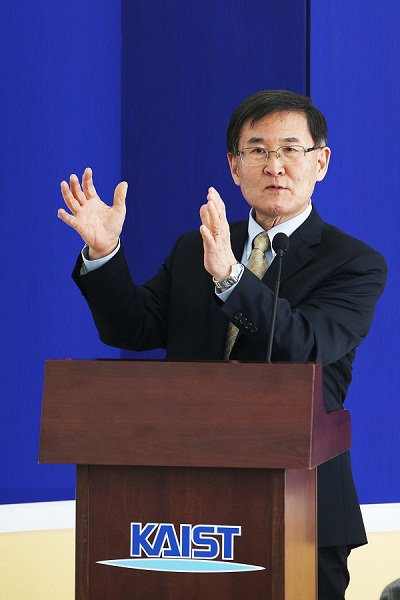 KAIST President Held One-year Anniversary Press Conference
President Steve Kang had a press conference
on February 25, 2014 at the Faculty Club on campus, commemorating the first
year of his presidency. About 30 different media representatives nationwide
attended the meeting.
At his first press conference on the anniversary of his tenure, President Kang
described what he has achieved in the past year, which were: 1) rebuilding the
campus culture to start a campaign for mutual respect, trust, and open
communication by holding meetings with the members of the KAIST community more
than 60 times, 2) establishing core values, creativity and challenge, to
enhance the fabric of the community, 3) restructuring of the university
administration, and 4) the announcement of the mid- and long-term development
plan.
He also mentioned that “2014 will be another exciting year for KAIST to make
more progress” and laid out a few major projects to be implemented this year:
launching of the “Committee for Engineering Education Innovation,” “Startup
KAIST” (an entrepreneurship program), “Greater Collaboration in Technology
Translation and Management with Seoul National University,” and “KAIST End Run”
(a global business incubation program).Explanation of 2014 Major Endeavors by President KangFor
the past decade, domestic engineering schools weighed SCI dissertation
publication more heavily in university evaluations, yielding a world-class
research level. However, such an approach resulted in placing less importance
on entrepreneurship, commercialization, or creating economic values.As a
result, engineering Professors have been evaluated as being too focused on theoretical
SCI dissertation research rather than practical research that could yield
economic benefits through commercialization of developed technology. In
addition, some have criticized that engineering universities have not educated
creative researchers demanded by the industry.KAIST
has begun responding to these criticisms and has made a few suggestions to strengthen
engineering education, promote entrepreneurship in engineers, and globalize Korean
venture companies.As
part of such efforts, KAIST established the KAIST Education and Research
Innovation Committee, composed of various individuals from the industry,
research institutes, alumni, faculty members, and others, to discuss ways to reinforce
engineering education.
A
course to encourage entrepreneurship will be implemented.Startup
KAIST will develop and commercialize innovative ideas from members of KAIST, and
the End Run project will enable students and faculty to establish a global,
venture company. KAIST hopes that a new entrepreneurial culture will be created
on campus, thereby the research success of KAIST members will lead to commercialization
and startups.KAIST
plans on releasing free internet lectures as part of its knowledge contribution
and sponsoring programs which will level the playing field in eduation.KAIST
will establish the KAIST Open Online Course (KOOC). An entrepreneurship
curriculum will be developed for KOOC. KAIST will start trials for KOOC from
2015, gradually expanding to include more courses.
2014.02.27 View 10394
KAIST President Held One-year Anniversary Press Conference
President Steve Kang had a press conference
on February 25, 2014 at the Faculty Club on campus, commemorating the first
year of his presidency. About 30 different media representatives nationwide
attended the meeting.
At his first press conference on the anniversary of his tenure, President Kang
described what he has achieved in the past year, which were: 1) rebuilding the
campus culture to start a campaign for mutual respect, trust, and open
communication by holding meetings with the members of the KAIST community more
than 60 times, 2) establishing core values, creativity and challenge, to
enhance the fabric of the community, 3) restructuring of the university
administration, and 4) the announcement of the mid- and long-term development
plan.
He also mentioned that “2014 will be another exciting year for KAIST to make
more progress” and laid out a few major projects to be implemented this year:
launching of the “Committee for Engineering Education Innovation,” “Startup
KAIST” (an entrepreneurship program), “Greater Collaboration in Technology
Translation and Management with Seoul National University,” and “KAIST End Run”
(a global business incubation program).Explanation of 2014 Major Endeavors by President KangFor
the past decade, domestic engineering schools weighed SCI dissertation
publication more heavily in university evaluations, yielding a world-class
research level. However, such an approach resulted in placing less importance
on entrepreneurship, commercialization, or creating economic values.As a
result, engineering Professors have been evaluated as being too focused on theoretical
SCI dissertation research rather than practical research that could yield
economic benefits through commercialization of developed technology. In
addition, some have criticized that engineering universities have not educated
creative researchers demanded by the industry.KAIST
has begun responding to these criticisms and has made a few suggestions to strengthen
engineering education, promote entrepreneurship in engineers, and globalize Korean
venture companies.As
part of such efforts, KAIST established the KAIST Education and Research
Innovation Committee, composed of various individuals from the industry,
research institutes, alumni, faculty members, and others, to discuss ways to reinforce
engineering education.
A
course to encourage entrepreneurship will be implemented.Startup
KAIST will develop and commercialize innovative ideas from members of KAIST, and
the End Run project will enable students and faculty to establish a global,
venture company. KAIST hopes that a new entrepreneurial culture will be created
on campus, thereby the research success of KAIST members will lead to commercialization
and startups.KAIST
plans on releasing free internet lectures as part of its knowledge contribution
and sponsoring programs which will level the playing field in eduation.KAIST
will establish the KAIST Open Online Course (KOOC). An entrepreneurship
curriculum will be developed for KOOC. KAIST will start trials for KOOC from
2015, gradually expanding to include more courses.
2014.02.27 View 10394 -
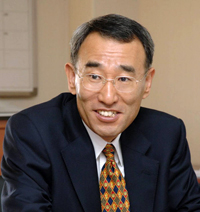 Professor Yong-Tak Im of Mechanical Engineering Appointed as President of Korea Institute of Machinery and Materials
Yong-Tak Im, Professor of the Department of
Mechanical Engineering at KAIST, was sworn in on February 25, 2014 as
the 16th president of the Korea Institute of Machinery and Materials
(KIMM), a leading government-funded research institution in Korea. KIMM was
established in 1976 to contribute to the development of
Korea through the invention of source technology and technology transfer in
mechanical engineering.
President Im graduated from Seoul National
University, obtaining degrees of Bachelor of Science and Master’s in mechanical
engineering. He later studied at the University of California in Berkeley and
received a doctoral degree in mechanical engineering.
After working as an assistant professor of
the Industrial and Systems Engineering at the Ohio State University,
President Im joined KAIST as a professor of mechanical engineering in 1989.
President Im took many important posts at
KAIST, including Dean of Planning Office, Dean of External Affairs and Public
Relations Office, and Associate Vice President of Special Projects and
Institutional Relations, making a great addition to the university’s endeavors for
globalization.
Among the awards President Im received was the
William Johnson Award in 2007 presented by the Advances in Materials and
Processing Technologies, the Research Achievement Award in 2010 by the Global
Congress on Manufacturing and Management, and the Presidential Award in 2012 by
the Republic of Korea. He was also elected as the vice president of the Korean
Society of Mechanical Engineers, the largest association of professionals in
the mechanical engineering field in Korea.
President Im is currently a professor at
POSCO, an internationally known Korean steel company, and a member of the
Korean Academy of Science and Technology and the National Academy of
Engineering of Korea, respectively.
President Im will serve KIMM for three
years until February 24, 2017.
2014.02.25 View 12471
Professor Yong-Tak Im of Mechanical Engineering Appointed as President of Korea Institute of Machinery and Materials
Yong-Tak Im, Professor of the Department of
Mechanical Engineering at KAIST, was sworn in on February 25, 2014 as
the 16th president of the Korea Institute of Machinery and Materials
(KIMM), a leading government-funded research institution in Korea. KIMM was
established in 1976 to contribute to the development of
Korea through the invention of source technology and technology transfer in
mechanical engineering.
President Im graduated from Seoul National
University, obtaining degrees of Bachelor of Science and Master’s in mechanical
engineering. He later studied at the University of California in Berkeley and
received a doctoral degree in mechanical engineering.
After working as an assistant professor of
the Industrial and Systems Engineering at the Ohio State University,
President Im joined KAIST as a professor of mechanical engineering in 1989.
President Im took many important posts at
KAIST, including Dean of Planning Office, Dean of External Affairs and Public
Relations Office, and Associate Vice President of Special Projects and
Institutional Relations, making a great addition to the university’s endeavors for
globalization.
Among the awards President Im received was the
William Johnson Award in 2007 presented by the Advances in Materials and
Processing Technologies, the Research Achievement Award in 2010 by the Global
Congress on Manufacturing and Management, and the Presidential Award in 2012 by
the Republic of Korea. He was also elected as the vice president of the Korean
Society of Mechanical Engineers, the largest association of professionals in
the mechanical engineering field in Korea.
President Im is currently a professor at
POSCO, an internationally known Korean steel company, and a member of the
Korean Academy of Science and Technology and the National Academy of
Engineering of Korea, respectively.
President Im will serve KIMM for three
years until February 24, 2017.
2014.02.25 View 12471 -
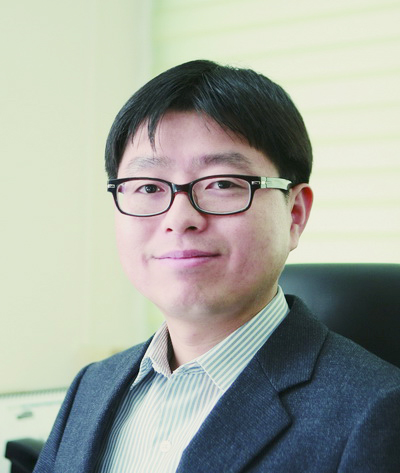 Phys.org: Researchers develop non-iridescent, structural, full-spectrum pigments for reflective displays
The latest research work by Professor Shin-Hyun Kim of Chemical and Biomolecular Engineering at KAIST on the “microcapsulation og photonic crystals using osmotic pressure” has been published by Phys.org, a leading web-based science, research and technology news. For the articles, please click the link below:February 20, 2014Researchers develop non-iridescent, structural, full-spectrum pigments for reflective displayshttp://phys.org/news/2014-02-non-iridescent-full-spectrum-pigments.html
2014.02.21 View 9153
Phys.org: Researchers develop non-iridescent, structural, full-spectrum pigments for reflective displays
The latest research work by Professor Shin-Hyun Kim of Chemical and Biomolecular Engineering at KAIST on the “microcapsulation og photonic crystals using osmotic pressure” has been published by Phys.org, a leading web-based science, research and technology news. For the articles, please click the link below:February 20, 2014Researchers develop non-iridescent, structural, full-spectrum pigments for reflective displayshttp://phys.org/news/2014-02-non-iridescent-full-spectrum-pigments.html
2014.02.21 View 9153 -
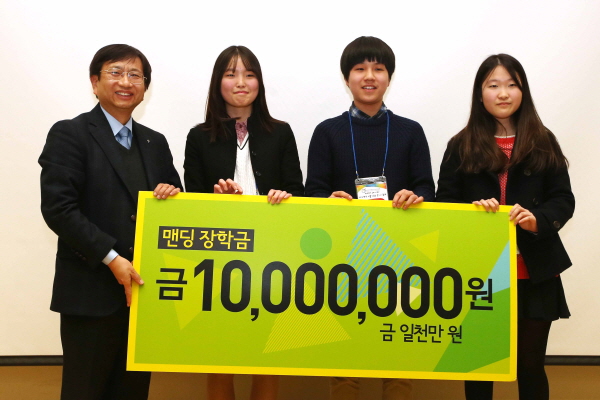 Venture Startup by Middle School Students Makes Donation to KAIST
Korean middle school students who
participated in a venture program made donations to KAIST. “Mending”, a startup founded by Korean
middle school students, donated 10 million won and the education supplier “Edubox”
contributed 100 million won to the IP Education Center for Young Venture Candidates
at KAIST. The donations were made at the IP
Education Center’s 3rd graduation ceremony on February 14th
at KAIST. Mending was started by three students in
the IP Education Center in 2013. This startup
features volunteering through talent sharing and other educational endeavors. It
received voluntary donations from supporters of the programs. Hee-Yon Yon, the co-president of
Mending, said, “We have developed a new concept of business and showed profit
can be made through donations and sharing”. Edubox responded to the visions of
Mending and added to the donation for additional development of the IP
Education Center. The KAIST IP Education Center for
Young Venture Candidates was founded with the support of KIPO (Korean
Intellectual Property Office) and KIPA (Korea Invention Promotion Association)
in 2009. The curriculum consists of Intellectual Property, Entrepreneurship, Future
Technology and Humanities. Eighty students are selected for the program every
year and 200 students have successfully completed the program.
2014.02.18 View 8221
Venture Startup by Middle School Students Makes Donation to KAIST
Korean middle school students who
participated in a venture program made donations to KAIST. “Mending”, a startup founded by Korean
middle school students, donated 10 million won and the education supplier “Edubox”
contributed 100 million won to the IP Education Center for Young Venture Candidates
at KAIST. The donations were made at the IP
Education Center’s 3rd graduation ceremony on February 14th
at KAIST. Mending was started by three students in
the IP Education Center in 2013. This startup
features volunteering through talent sharing and other educational endeavors. It
received voluntary donations from supporters of the programs. Hee-Yon Yon, the co-president of
Mending, said, “We have developed a new concept of business and showed profit
can be made through donations and sharing”. Edubox responded to the visions of
Mending and added to the donation for additional development of the IP
Education Center. The KAIST IP Education Center for
Young Venture Candidates was founded with the support of KIPO (Korean
Intellectual Property Office) and KIPA (Korea Invention Promotion Association)
in 2009. The curriculum consists of Intellectual Property, Entrepreneurship, Future
Technology and Humanities. Eighty students are selected for the program every
year and 200 students have successfully completed the program.
2014.02.18 View 8221 -
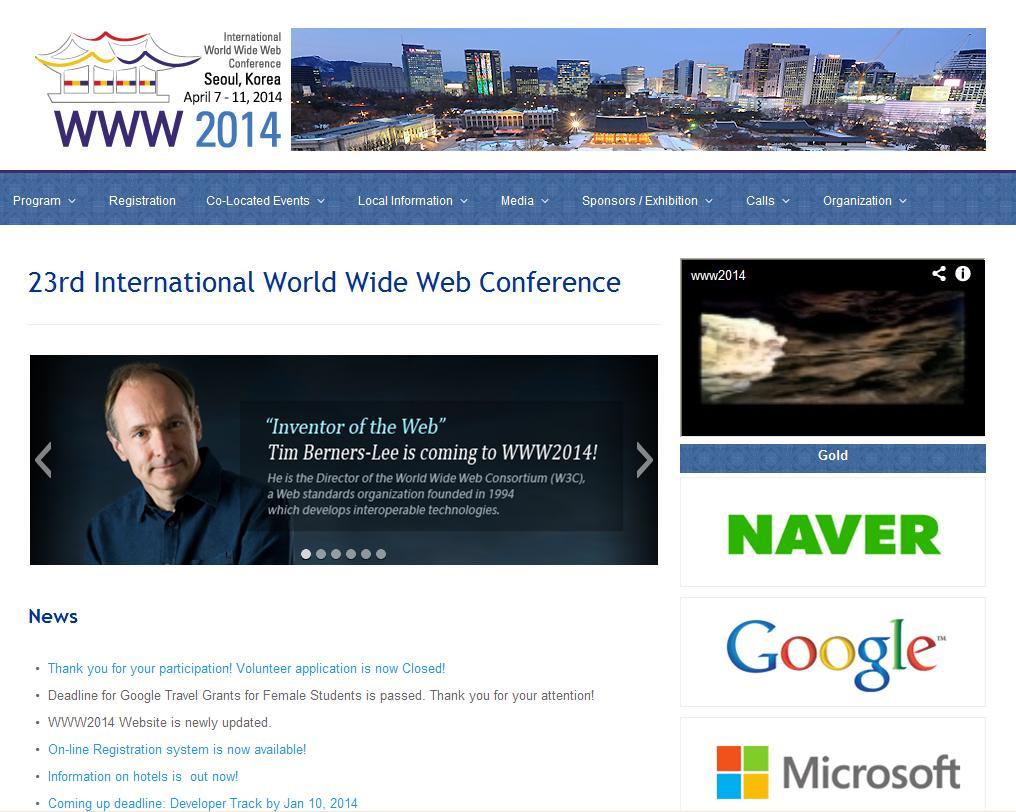 World's Largest Web Conference To Be Held in Korea
The 2014 International World Wide Web Conference (WWW 2014), the world’s most prestigious academic conference in the field of web, will be held for the first time in Korea. The conference is to be last for five days at Seoul COEX, from 7th to 11th April. International World Wide Web Conference covers a wide range of web-related areas, including technologies, research papers, services and more. Since the first conference in 1994 in Switzerland, it has been held in various parts of North America, Europe, South America and Asia, attracting more than 1000 experts in the field. The 23rd International World Wide Web Conference is managed by the International World Wide Web Conferences Steering Committee (IW3C2) and co-hosted by KAIST and National Agency for Technology and Standards, as well as sponsored by Korea Information Science Society and the World Wide Web Consortium (W3C). Keynote speakers for this year’s conference include inventor of the World Wide Web, Sir Tim Berners-Lee, senior vice president of Microsoft, Dr. Qi Lu, and Carnegie Mellon University’s Prof. Christos Faloutsos, as well as Samsung Electronic’s vice president Jong-Deok Choi. In addition to WWW 2014, BigData Innovators Gathering (BIG 2014) and Web for Access (W4A 2014) is also to be held in joint. KAIST Computer Sciences Department’s Prof. Jinwan Jeong, in charge of directing this year’s conference, said “From one-sided 1st generation web to two-way 2nd generation web, such as blogs, and then recently to the 3rd generation web, which include social networks and semantic webs, the web technologies has grown vastly over the past 25 years. WWW 2014 will be the opportunity for Korea to discuss with the world about the informatization and future of the web.” Pre-registration for WWW 2014 can be applied at the official webpage for WWW 2014 (http://www2014.kr) before 17th February.
2014.02.14 View 11967
World's Largest Web Conference To Be Held in Korea
The 2014 International World Wide Web Conference (WWW 2014), the world’s most prestigious academic conference in the field of web, will be held for the first time in Korea. The conference is to be last for five days at Seoul COEX, from 7th to 11th April. International World Wide Web Conference covers a wide range of web-related areas, including technologies, research papers, services and more. Since the first conference in 1994 in Switzerland, it has been held in various parts of North America, Europe, South America and Asia, attracting more than 1000 experts in the field. The 23rd International World Wide Web Conference is managed by the International World Wide Web Conferences Steering Committee (IW3C2) and co-hosted by KAIST and National Agency for Technology and Standards, as well as sponsored by Korea Information Science Society and the World Wide Web Consortium (W3C). Keynote speakers for this year’s conference include inventor of the World Wide Web, Sir Tim Berners-Lee, senior vice president of Microsoft, Dr. Qi Lu, and Carnegie Mellon University’s Prof. Christos Faloutsos, as well as Samsung Electronic’s vice president Jong-Deok Choi. In addition to WWW 2014, BigData Innovators Gathering (BIG 2014) and Web for Access (W4A 2014) is also to be held in joint. KAIST Computer Sciences Department’s Prof. Jinwan Jeong, in charge of directing this year’s conference, said “From one-sided 1st generation web to two-way 2nd generation web, such as blogs, and then recently to the 3rd generation web, which include social networks and semantic webs, the web technologies has grown vastly over the past 25 years. WWW 2014 will be the opportunity for Korea to discuss with the world about the informatization and future of the web.” Pre-registration for WWW 2014 can be applied at the official webpage for WWW 2014 (http://www2014.kr) before 17th February.
2014.02.14 View 11967 -
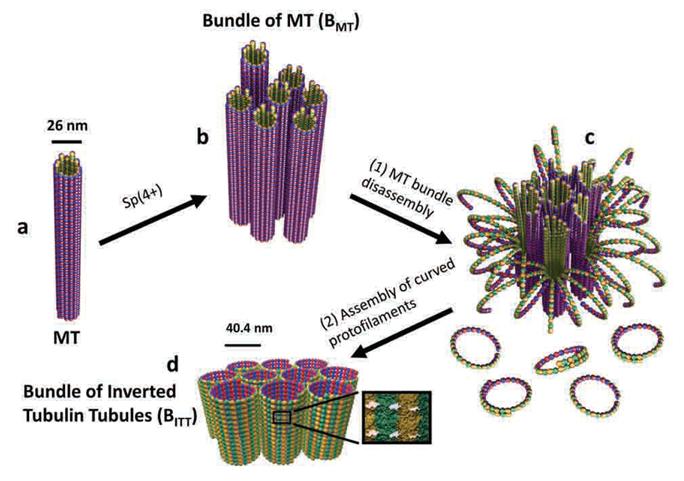 A Molecular Switch Controlling Self-Assembly of Protein Nanotubes Discovered
International collaborative research among South Korea, United States, and Israel research institutionsThe key to the treatment of cancer and brain disease mechanism The molecular switch that controls the self-assembly structure of the protein nanotubes, which plays crucial role in cell division and intracellular transport of materials, has been discovered. KAIST Bio and Brain Engineering Department’s Professor Myeong-Cheol Choi and Professor Chae-Yeon Song conducted the research, in collaboration with the University of California in Santa Barbara, U.S., and Hebrew University in Israel. The findings of the research were published in Nature Materials on the 19th. Microtubules are tube shaped and composed of protein that plays a key role in cell division, cytoskeleton, and intercellular material transport and is only 25nm in diameter (1/100,000 thickness of a human hair). Conventionally, cancer treatment focused on disrupting the formation of microtubules to suppress the division of cancer cells. In addition Alzheimer’s is known to be caused by the diminishing of structural integrity of microtubules responsible for intercellular material transport which leads to failure in signal transfer. The research team utilized synchrotron x-ray scattering and transmission electron microscope to analyze the self assemble structure of protein nanotubes to subnanometer accuracy. As a result, the microtubules were found to assemble into 25nm thickness tubules by stacking protein blocks 4 x 5 x 8nm in dimension. In the process, the research team discovered the molecular switch that controls the shape of these protein blocks. In addition the research team was successful in creating a new protein tube structure. Professor Choi commented that they were successful in introducing a new paradigm that suggests the possibility of controlling the complex biological functions of human’s biological system with the simple use of physical principles. He commented further that it is anticipated that the findings will allow for the application of bio nanotubes in engineering and that this is a small step in finding the mechanism behind cancer treatment and neural diseases.
2014.02.03 View 11545
A Molecular Switch Controlling Self-Assembly of Protein Nanotubes Discovered
International collaborative research among South Korea, United States, and Israel research institutionsThe key to the treatment of cancer and brain disease mechanism The molecular switch that controls the self-assembly structure of the protein nanotubes, which plays crucial role in cell division and intracellular transport of materials, has been discovered. KAIST Bio and Brain Engineering Department’s Professor Myeong-Cheol Choi and Professor Chae-Yeon Song conducted the research, in collaboration with the University of California in Santa Barbara, U.S., and Hebrew University in Israel. The findings of the research were published in Nature Materials on the 19th. Microtubules are tube shaped and composed of protein that plays a key role in cell division, cytoskeleton, and intercellular material transport and is only 25nm in diameter (1/100,000 thickness of a human hair). Conventionally, cancer treatment focused on disrupting the formation of microtubules to suppress the division of cancer cells. In addition Alzheimer’s is known to be caused by the diminishing of structural integrity of microtubules responsible for intercellular material transport which leads to failure in signal transfer. The research team utilized synchrotron x-ray scattering and transmission electron microscope to analyze the self assemble structure of protein nanotubes to subnanometer accuracy. As a result, the microtubules were found to assemble into 25nm thickness tubules by stacking protein blocks 4 x 5 x 8nm in dimension. In the process, the research team discovered the molecular switch that controls the shape of these protein blocks. In addition the research team was successful in creating a new protein tube structure. Professor Choi commented that they were successful in introducing a new paradigm that suggests the possibility of controlling the complex biological functions of human’s biological system with the simple use of physical principles. He commented further that it is anticipated that the findings will allow for the application of bio nanotubes in engineering and that this is a small step in finding the mechanism behind cancer treatment and neural diseases.
2014.02.03 View 11545 -
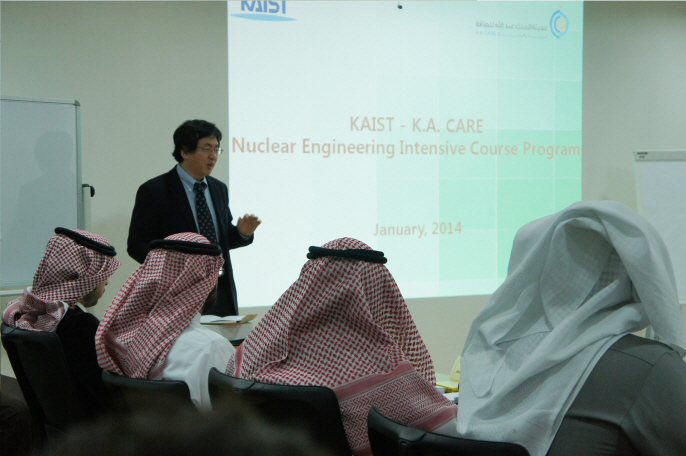 KAIST-Saudi Nuclear Workforce Training
Nuclear Engineering Intensive Course Program Held in Saudi Arabia from January 5th to 23rd
KUSTAR (The Khalifa University of Science and Technology Studies)-KAIST Institute of Education began its Nuclear Engineering Intensive Course Program on 5th January with researchers from K.A.CARE (King Abdullah City for Atomic and Renewable Energy) of Riyadh, Saudi Arabia.
This program, which was lasted until 23rd January, provided education to students on the basic technologies in the field of nuclear power.
The course involves a wide range of lectures, such as basic nuclear physics, applications using radiation, nuclear reactor design and safety, as well as nuclear power engineering.
In order to utilize the nuclear power and renewable energy, K.A.CARE was established in April 2010. The institution is also involved in the construction of nuclear infrastructure, including the site investigations, the establishment of regulatory bodies and state-owned nuclear companies, along with the newly launched workforce-training program.
The Director of the KUSTAR-KAIST Education Research Institute, Professor Soong-Heung Jang said, “This program is the beginning of long-term cooperation with Saudi Arabia. Our experience can be the basis for the construction of an extensive training program that involves many areas of nuclear engineering field.”
KAIST has been working in close cooperation with various institutions around the world, which also includes the establishment of KUSTAR-KAIST Institute of Education and Research in July 2010. KAIST is also actively cooperating with UAE Khalifa University in Middle East, sharing faculty, holding joint research programs and exchanging students.
2014.02.03 View 12334
KAIST-Saudi Nuclear Workforce Training
Nuclear Engineering Intensive Course Program Held in Saudi Arabia from January 5th to 23rd
KUSTAR (The Khalifa University of Science and Technology Studies)-KAIST Institute of Education began its Nuclear Engineering Intensive Course Program on 5th January with researchers from K.A.CARE (King Abdullah City for Atomic and Renewable Energy) of Riyadh, Saudi Arabia.
This program, which was lasted until 23rd January, provided education to students on the basic technologies in the field of nuclear power.
The course involves a wide range of lectures, such as basic nuclear physics, applications using radiation, nuclear reactor design and safety, as well as nuclear power engineering.
In order to utilize the nuclear power and renewable energy, K.A.CARE was established in April 2010. The institution is also involved in the construction of nuclear infrastructure, including the site investigations, the establishment of regulatory bodies and state-owned nuclear companies, along with the newly launched workforce-training program.
The Director of the KUSTAR-KAIST Education Research Institute, Professor Soong-Heung Jang said, “This program is the beginning of long-term cooperation with Saudi Arabia. Our experience can be the basis for the construction of an extensive training program that involves many areas of nuclear engineering field.”
KAIST has been working in close cooperation with various institutions around the world, which also includes the establishment of KUSTAR-KAIST Institute of Education and Research in July 2010. KAIST is also actively cooperating with UAE Khalifa University in Middle East, sharing faculty, holding joint research programs and exchanging students.
2014.02.03 View 12334 -
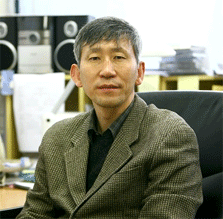 Professor Suk-Bok Chang receives 14th Korea Science Award in the field of Chemistry
Professor Suk-Bok Chang from the Department of Chemistry at KAIST received the “2013 Korea Science Award” in chemistry hosted by the National Research Foundation and the Ministry of Science, ICT, and Future Planning, Republic of Korea.
The Korea Science Award is a presidential award of Korea, which was first established in 1987 to recognize research excellence in natural science. Three scientists are selected for the award in every other year.
Professor Chang primarily researches the catalyzing mechanism of carbon-hydrogen bonds in organic molecules. He has succeeded in making great progress in the field of organic chemistry especially in developing a new type of transition metal catalytic behavior that can be applied to low-reactivity compounds.
Hydrocarbons are abundant in nature, but its unreactive nature in ambient conditions makes it unsuitable as reactant for compound synthesis. In addition, the mechanism behind transition metal catalyzed carbon-hydrogen bond synthesis has not been proven sufficiently.
The prediction that fossil fuels will be depleted before the end of the century makes hydrocarbon synthesis an extremely important matter.
The need for an effective hydrocarbon synthesis method inspired Professor Chang to pursue research in the transition metal catalysis method and to develop a catalytic system that would allow efficient synthesis even in ambient conditions.
Professor Chang has been the lead researcher for the Institute for Basic Science’s “molecule catalysis reaction research team” since December 2012 and has been carrying out this research in KAIST.
2014.01.27 View 12367
Professor Suk-Bok Chang receives 14th Korea Science Award in the field of Chemistry
Professor Suk-Bok Chang from the Department of Chemistry at KAIST received the “2013 Korea Science Award” in chemistry hosted by the National Research Foundation and the Ministry of Science, ICT, and Future Planning, Republic of Korea.
The Korea Science Award is a presidential award of Korea, which was first established in 1987 to recognize research excellence in natural science. Three scientists are selected for the award in every other year.
Professor Chang primarily researches the catalyzing mechanism of carbon-hydrogen bonds in organic molecules. He has succeeded in making great progress in the field of organic chemistry especially in developing a new type of transition metal catalytic behavior that can be applied to low-reactivity compounds.
Hydrocarbons are abundant in nature, but its unreactive nature in ambient conditions makes it unsuitable as reactant for compound synthesis. In addition, the mechanism behind transition metal catalyzed carbon-hydrogen bond synthesis has not been proven sufficiently.
The prediction that fossil fuels will be depleted before the end of the century makes hydrocarbon synthesis an extremely important matter.
The need for an effective hydrocarbon synthesis method inspired Professor Chang to pursue research in the transition metal catalysis method and to develop a catalytic system that would allow efficient synthesis even in ambient conditions.
Professor Chang has been the lead researcher for the Institute for Basic Science’s “molecule catalysis reaction research team” since December 2012 and has been carrying out this research in KAIST.
2014.01.27 View 12367 -
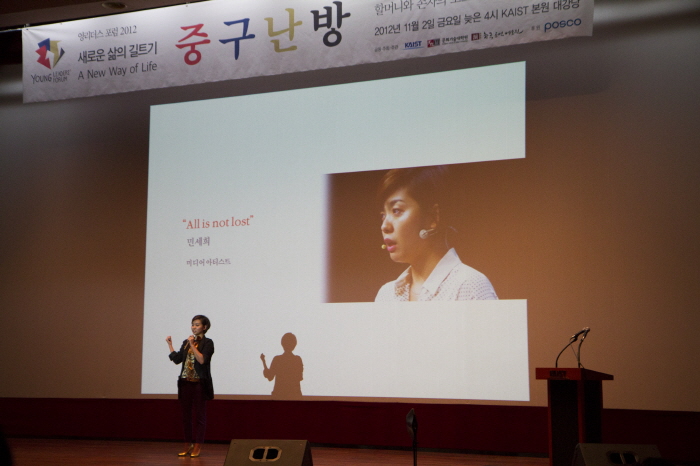 Collaborated Performance and Talk Battle Event Held by Graduate School of Culture Technology, KAIST
A unique event consisting of a new media performance and talk battle was held for middle school, high school, and college students during the winter break.
The Graduate School of Culture Technology at KAIST and the Korea Art Conservatory co-organized the 3rd Young Leaders Forum under the title “Collaboration of the Current and the New Culture” on January 18th at the Seoul Namsan Traditional Theater.
The Young Leaders Forum was founded to share knowledge and wisdom among different fields and generations and to foster creative lifestyles through the collaboration of wisdom.
The collaborated performance, “The Garden of Western Heaven”, was performed using new media technology by students from the Graduate School of Culture Technology and actors from the Korea Art Conservatory.
Three panels participated in the “Talk Battle” and held a discussion on “The New Culture from Performance and Collaboration”.
Woong-Rae Cho, CEO of The Mackiss Company, who sponsored the clay road in Gyejok Mountain and the Concert in the Forest, Professor Sung-Kuk Kim from School of Korean Music at Chung-Ang University, and Je-Ho Oh, a graduate student from the Graduate School of Culture Technology at KAIST participated in the discussion and shared their opinions with the audience.
2014.01.27 View 6863
Collaborated Performance and Talk Battle Event Held by Graduate School of Culture Technology, KAIST
A unique event consisting of a new media performance and talk battle was held for middle school, high school, and college students during the winter break.
The Graduate School of Culture Technology at KAIST and the Korea Art Conservatory co-organized the 3rd Young Leaders Forum under the title “Collaboration of the Current and the New Culture” on January 18th at the Seoul Namsan Traditional Theater.
The Young Leaders Forum was founded to share knowledge and wisdom among different fields and generations and to foster creative lifestyles through the collaboration of wisdom.
The collaborated performance, “The Garden of Western Heaven”, was performed using new media technology by students from the Graduate School of Culture Technology and actors from the Korea Art Conservatory.
Three panels participated in the “Talk Battle” and held a discussion on “The New Culture from Performance and Collaboration”.
Woong-Rae Cho, CEO of The Mackiss Company, who sponsored the clay road in Gyejok Mountain and the Concert in the Forest, Professor Sung-Kuk Kim from School of Korean Music at Chung-Ang University, and Je-Ho Oh, a graduate student from the Graduate School of Culture Technology at KAIST participated in the discussion and shared their opinions with the audience.
2014.01.27 View 6863 -
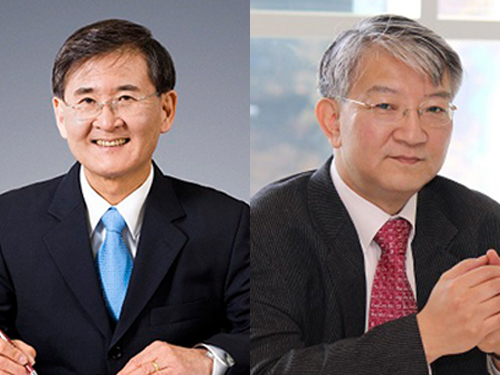 KAIST Participates in the 2014 Davos Forum on January 22-25 in Switzerland
Through the sessions of the Global University Leaders Forum, IdeasLab, and Global Agenda Councils on Biotechnology, KAIST participants will actively engage with global leaders in the discussion of issues on education innovation and technological breakthroughs.
The 2014 Annual Meeting of the World Economic Forum (WEF), known as the Davos Forum, will kick off on January 22-25 in Davos-Klosters, Switzerland, under the theme of "The Reshaping of the World: Consequences for Society, Politics, and Business." Each year, the Forum attracts about 2,500 distinguished leaders from all around the world and provides an open platform to identify the current and emerging challenges facing the global community and to develop ideas and actions necessary to respond to such challenges.
President Sung-Mo Steve Kang and Distinguished Professor Sang Yup Lee from the Department of Chemical and Biomolecular Engineering, KAIST, will attend the Forum and engage in a series of dialogues on such issues as Massive Open Online Courses, new paradigms for universities and researchers, the transformation of higher education, the role and value of scientific discoveries, and the impact of biotechnology on the future of society and business.
At the session entitled "New Paradigms for Universities of the Future" hosted by the Global University Leaders Forum (GULF), President Kang will introduce KAIST"s ongoing online education program, Education 3.0. GULF was created in 2006 by WEF, which is a small community of the presidents and senior representatives of the top universities in the world.
Implemented in 2012, Education 3.0 incorporates advanced information and communications technology (ICT) to offer students and teachers a learner-based, team-oriented learning and teaching environment. Under Education 3.0, students study online and meet in groups with a professor for in-depth discussions, collaboration, and problem-solving. KAIST plans to expand the program to embrace the global community in earnest by establishing Education 3.0 Global in order to have interactive real-time classes for students and researchers across regions and cultures.
President Kang will also present a paper entitled "Toward Socially Responsible Technology: KAIST"s Approach to Integrating Social and Behavioral Perspectives into Technology Development" at another session of GULF called "Seeking New Approaches to Critical Global Challenges." In the paper, President Kang points out that notwithstanding the many benefits we enjoy from the increasingly interconnected world, digital media may pose a threat to become a new outlet for social problems, for example, Internet or digital addiction.
Experts say that early exposure to digital devices harms the healthy development of cognitive functions, emotions, and social behavior. President Kang will introduce KAIST"s recent endeavor to develop a non-intrusive technology to help prevent digital addiction, which will ultimately be embedded in the form of a virtual coach or mentor that helps and guides people under risk to make constructive use of digital devices. President Kang stresses the fundamental shift in the science and technology development paradigm from research and development (R&D) to a research and solution development (R&SD), taking serious consideration of societal needs, quality of life, and social impacts when conducting research.
Professor Sang Yup Lee will moderate the IdeasLab session at the Davos Forum entitled "From Lab to Life with the California Institute of Technology (Caltech)." Together with scientists from Caltech, he will discuss scientific breakthroughs that transform institutions, industries, and individuals in the near future, such as the development of damage-tolerant lightweight materials with nanotechnology, the ability to read and write genomes, and wireless lab-in-the-body monitors. In addition, he will meet global business leaders at the session of "Sustainability, Innovation, and Growth" and speak about how emerging technologies, biotechnology in particular, will transform future societies, business, and industries.
As a current special adviser of the World Economic Forum"s (WEF) Chemicals Industry Community, Professor Lee will meet global chairs and chief executive officers of chemical companies and discuss ways to advance the industry to become more bio-based and environmentally friendly. He served as a founding chairman of WEF"s Global Agenda Councils on Biotechnology in 2013.
President Sung-Mo Steve Kang Distinguished Professor Sang Yup Lee
2014.01.17 View 12196
KAIST Participates in the 2014 Davos Forum on January 22-25 in Switzerland
Through the sessions of the Global University Leaders Forum, IdeasLab, and Global Agenda Councils on Biotechnology, KAIST participants will actively engage with global leaders in the discussion of issues on education innovation and technological breakthroughs.
The 2014 Annual Meeting of the World Economic Forum (WEF), known as the Davos Forum, will kick off on January 22-25 in Davos-Klosters, Switzerland, under the theme of "The Reshaping of the World: Consequences for Society, Politics, and Business." Each year, the Forum attracts about 2,500 distinguished leaders from all around the world and provides an open platform to identify the current and emerging challenges facing the global community and to develop ideas and actions necessary to respond to such challenges.
President Sung-Mo Steve Kang and Distinguished Professor Sang Yup Lee from the Department of Chemical and Biomolecular Engineering, KAIST, will attend the Forum and engage in a series of dialogues on such issues as Massive Open Online Courses, new paradigms for universities and researchers, the transformation of higher education, the role and value of scientific discoveries, and the impact of biotechnology on the future of society and business.
At the session entitled "New Paradigms for Universities of the Future" hosted by the Global University Leaders Forum (GULF), President Kang will introduce KAIST"s ongoing online education program, Education 3.0. GULF was created in 2006 by WEF, which is a small community of the presidents and senior representatives of the top universities in the world.
Implemented in 2012, Education 3.0 incorporates advanced information and communications technology (ICT) to offer students and teachers a learner-based, team-oriented learning and teaching environment. Under Education 3.0, students study online and meet in groups with a professor for in-depth discussions, collaboration, and problem-solving. KAIST plans to expand the program to embrace the global community in earnest by establishing Education 3.0 Global in order to have interactive real-time classes for students and researchers across regions and cultures.
President Kang will also present a paper entitled "Toward Socially Responsible Technology: KAIST"s Approach to Integrating Social and Behavioral Perspectives into Technology Development" at another session of GULF called "Seeking New Approaches to Critical Global Challenges." In the paper, President Kang points out that notwithstanding the many benefits we enjoy from the increasingly interconnected world, digital media may pose a threat to become a new outlet for social problems, for example, Internet or digital addiction.
Experts say that early exposure to digital devices harms the healthy development of cognitive functions, emotions, and social behavior. President Kang will introduce KAIST"s recent endeavor to develop a non-intrusive technology to help prevent digital addiction, which will ultimately be embedded in the form of a virtual coach or mentor that helps and guides people under risk to make constructive use of digital devices. President Kang stresses the fundamental shift in the science and technology development paradigm from research and development (R&D) to a research and solution development (R&SD), taking serious consideration of societal needs, quality of life, and social impacts when conducting research.
Professor Sang Yup Lee will moderate the IdeasLab session at the Davos Forum entitled "From Lab to Life with the California Institute of Technology (Caltech)." Together with scientists from Caltech, he will discuss scientific breakthroughs that transform institutions, industries, and individuals in the near future, such as the development of damage-tolerant lightweight materials with nanotechnology, the ability to read and write genomes, and wireless lab-in-the-body monitors. In addition, he will meet global business leaders at the session of "Sustainability, Innovation, and Growth" and speak about how emerging technologies, biotechnology in particular, will transform future societies, business, and industries.
As a current special adviser of the World Economic Forum"s (WEF) Chemicals Industry Community, Professor Lee will meet global chairs and chief executive officers of chemical companies and discuss ways to advance the industry to become more bio-based and environmentally friendly. He served as a founding chairman of WEF"s Global Agenda Councils on Biotechnology in 2013.
President Sung-Mo Steve Kang Distinguished Professor Sang Yup Lee
2014.01.17 View 12196 -
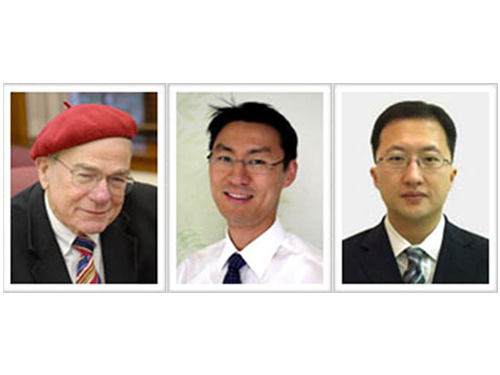 Materials Developed for Sodium Rechargeable Battery by EEWS
The research group of Professor William Goddard III, You-Sung Jung, and Jang-Wook Choi from the Graduate School of Energy, Environment, Water, and Sustainability (EEWS) at KAIST has developed a new sodium-ion rechargeable battery which operates at a high voltage, can be charged, and stably discharges over 10,000 cycles. The research results were published in the online version of the Proceedings of the National Academy of Sciences of the United States of America (PNAS) on December 30, 2013.
Since the material costs of sodium rechargeable batteries is 30 to 40 times lower than lithium batteries, it has received attention as an energy saving tool for smart grids and as the next generation of lithium rechargeable batteries. Until now, sodium-ion rechargeable batteries have had issues with stability when charging and discharging. The research group developed a vanadium-based electrode to solve these problems.
The group said follow-up research will be continued to develop advanced technology on sodium rechargeable batteries as it is still currently in the beginning stages.
The research team: From left to right is Professors William Goddard, You-Sung Jung, and Jang-Wook Choi
2014.01.13 View 12455
Materials Developed for Sodium Rechargeable Battery by EEWS
The research group of Professor William Goddard III, You-Sung Jung, and Jang-Wook Choi from the Graduate School of Energy, Environment, Water, and Sustainability (EEWS) at KAIST has developed a new sodium-ion rechargeable battery which operates at a high voltage, can be charged, and stably discharges over 10,000 cycles. The research results were published in the online version of the Proceedings of the National Academy of Sciences of the United States of America (PNAS) on December 30, 2013.
Since the material costs of sodium rechargeable batteries is 30 to 40 times lower than lithium batteries, it has received attention as an energy saving tool for smart grids and as the next generation of lithium rechargeable batteries. Until now, sodium-ion rechargeable batteries have had issues with stability when charging and discharging. The research group developed a vanadium-based electrode to solve these problems.
The group said follow-up research will be continued to develop advanced technology on sodium rechargeable batteries as it is still currently in the beginning stages.
The research team: From left to right is Professors William Goddard, You-Sung Jung, and Jang-Wook Choi
2014.01.13 View 12455 -
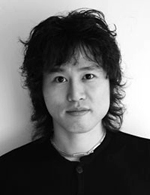 Professor Sang-Min received an award for scholar of the year from the KAISTian of the Year 2013
KAIST nominates a “Scholar of the Year” each year and presents the award to the recipient at a New Year’s opening ceremony. For the year 2013, Professor Sang-Min Bae of the Industrial Design Department at KAIST was named “KAIST Scholar of 2013” and received the award on January 2, 2014.
Professor Bae has been recognized for his design achievement in 2013: D’Light, a kinetic lighting that employs a transformable lampshade using flexible honeycomb structure, became one of the finalists in the living room and bedroom category of the International Design Excellence Award 2013 and was selected one of the best 100 for the 2013 Good Design Award. Users can easily change the shape and light intensity of the lamp by simply pivoting the lampshade with its small handle.
Professor Bae has also actively pursued his own philanthrophic projects through design: he has given the profits from the sales of his designs including D’Light directly toward a scholarship for needy children.
The Scholar of the Year award is presented to a faculty member or researcher at KAIST who has contributed to the advancement of science and technology such as publication of articles with influential research outcomes, invention of breakthrough technology, implementation of outstanding research projects, and improvement of public life. Professor Bae is the 13 th winner of the KAIST award.
The Korea Times, a leading English language newspaper in Korea, published an article on this award. For the article, please visit http://www.koreatimes.co.kr/www/news/people/2014/01/178_149117.html .
2014.01.09 View 12113
Professor Sang-Min received an award for scholar of the year from the KAISTian of the Year 2013
KAIST nominates a “Scholar of the Year” each year and presents the award to the recipient at a New Year’s opening ceremony. For the year 2013, Professor Sang-Min Bae of the Industrial Design Department at KAIST was named “KAIST Scholar of 2013” and received the award on January 2, 2014.
Professor Bae has been recognized for his design achievement in 2013: D’Light, a kinetic lighting that employs a transformable lampshade using flexible honeycomb structure, became one of the finalists in the living room and bedroom category of the International Design Excellence Award 2013 and was selected one of the best 100 for the 2013 Good Design Award. Users can easily change the shape and light intensity of the lamp by simply pivoting the lampshade with its small handle.
Professor Bae has also actively pursued his own philanthrophic projects through design: he has given the profits from the sales of his designs including D’Light directly toward a scholarship for needy children.
The Scholar of the Year award is presented to a faculty member or researcher at KAIST who has contributed to the advancement of science and technology such as publication of articles with influential research outcomes, invention of breakthrough technology, implementation of outstanding research projects, and improvement of public life. Professor Bae is the 13 th winner of the KAIST award.
The Korea Times, a leading English language newspaper in Korea, published an article on this award. For the article, please visit http://www.koreatimes.co.kr/www/news/people/2014/01/178_149117.html .
2014.01.09 View 12113